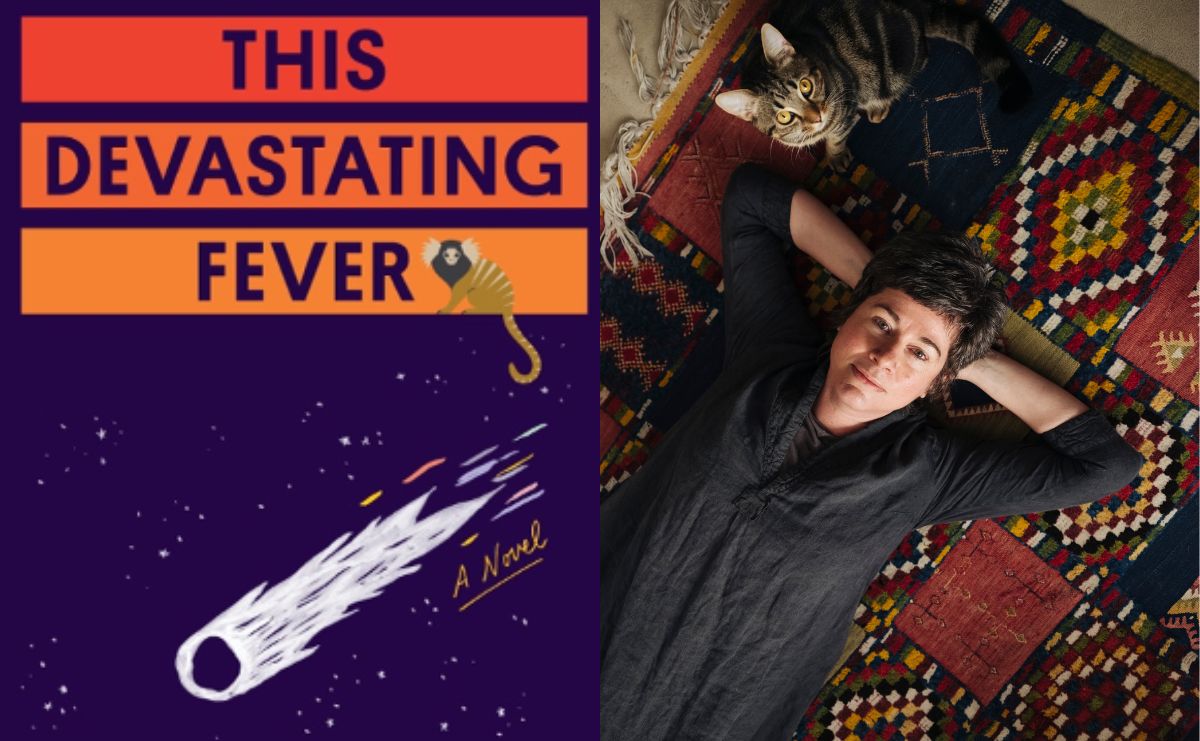In This Devastating Fever, Sophie Cunningham charts a fictional account of queer white Australian author Alice Fox’s 20-year battle to write a historical novel about Leonard Woolf, the late author, spouse of Virginia Woolf and publisher of much of the Bloomsbury set’s literary canon. The majority of the novel’s backdrop occurs in the context of the COVID-19 pandemic.
The book opens with Virginia Woolf cajoling Leonard into attending a party in matching costumes of bookshelves titled Fiction and Non-Fiction, giving the reader an early glimpse into the kind of playful, self-referential novel we are in for.
We then meet Fox (presumably an alter ego of Cunningham), who tries to justify to her long-suffering literary agent why she can’t get her Leonard Woolf novel done. There is her novel-writing class to run, she says. Then there are her two new Burmese cats to play with, plus trips to IKEA to worry about – not to mention the plague, fire and floods ravaging everyday life as we know it.
We also bear witness to the human cost of COVID-19 as Fox is increasingly unable to visit her beloved parental figure Hen, who has early-onset dementia.
Over Zoom, Fox and her agent discuss different ways the book could be structured, the queer, polyamorous lives of the Woolf’s Bloomsbury set, and how much of Fox’s own autobiography she should weave in to provide the ‘narrative arc that readers seem to require’ these days. Through this set up, Cunningham touches on the collective anxieties of the Australian literary scene, from the vanishing profitability of the industry, the increasingly murky line between fiction and non-fiction, the role of research, and the impact of technology on writing and our attention spans.
In alternating chapters, the book shifts Alice Fox and Leonard Woolf to the early 20th century as he embarks on a new life in Ceylon (now Sri Lanka) to work in the British colonial administration. We gain further insights into Woolf as Fox researches his life by reading his old diaries and love letters kept in libraries around the world.
Soon, Fox starts being ‘haunted’ by Imaginary Leonard and Ghost Virginia, tongue-in-cheek spectres who appear at her side from time to time to wax lyrical about the past and provide emotional guidance during her enforced isolation.
Cunningham explores Woolf’s uneasy legacy in colonial Ceylon as he imposes the European practice of using cattle to plough the land which subsequently die of a mysterious disease. Woolf’s character is softened somewhat by the depiction of his love of golden-eyed leopards and pink flamingos. Cunningham uses the character of Mr Nallaperuma to provide biting commentary on the theft of their native land and Woolf’s role as colonial overlord.
In later chapters, Virginia Woolf’s mental health struggles are set against Fox’s angst about her decision to relocate Hen to a nursing home. Leonard Woolf’s role as Virginia’s carer is examined, as he force-feeds her milk and unilaterally decides she is too ill to ever have children. We are taken through Virginia Woolf’s tragic suicide by drowning, Leonard’s emotional devastation and his rapid re-partnering.
Cunningham also tackles Woolf’s experiences as a Jewish man as he, his wife and his beloved pet monkey take a disturbing day trip to Nazi-era Berlin to bear witness to the growing tide of fascism. As the book comes to a close, Fox gives a workshop on ‘How to Finish Your Novel’ while worrying about the coming storms, both literal and metaphorical.
Cunningham has not given herself an easy brief with This Devastating Fever. The book attempts to covers a plethora of contemporary anxieties from the pandemic, imperialism, healthcare and climate change in a chatty, conversational way.
Cunningham has tried to address the glaringly obvious problem of writing about the impact of COVID-19 lockdowns – that writing about not doing anything is basically quite boring – through the use of shifting time perspectives and literal literary hauntings. It’s a fun and important experiment that works in some places better than others. I’m left wondering if the book would’ve been more impactful if Cunningham had dropped the veneer of fiction altogether and just written about her own experiences researching and writing about Leonard Woolf.
Cunningham’s efforts to cover every political angle, often through Fox’s anxious thoughts, sometimes leaves the contemporary parts of the novel reading like a busy garden bed of social justice issues that haven’t been given enough room to grow.
Fox’s queer long-term relationship with Edith feels especially underdeveloped and feels like missed opportunity to grapple with the deeper emotional questions that the Woolf’s complex relationship throws up.
Read: Theatre review: Slow boat
Many writers will deeply relate to Fox’s ongoing doubts about her ability to finish her book and her concern about whether there’s really any point in writing at all. Many more will relate to the novel’s central, churning question: is humanity hurtling towards THE apocalypse, or has every generation felt like the world is about to end?
This Devastating Fever by Sophie Cunningham
Publisher: Ultimo Press
ISBN: 9781761150937
Format: Paperback
Pages: 313pp
RRP: $32.99
Publication Date: 7 September 2022
Four stars





